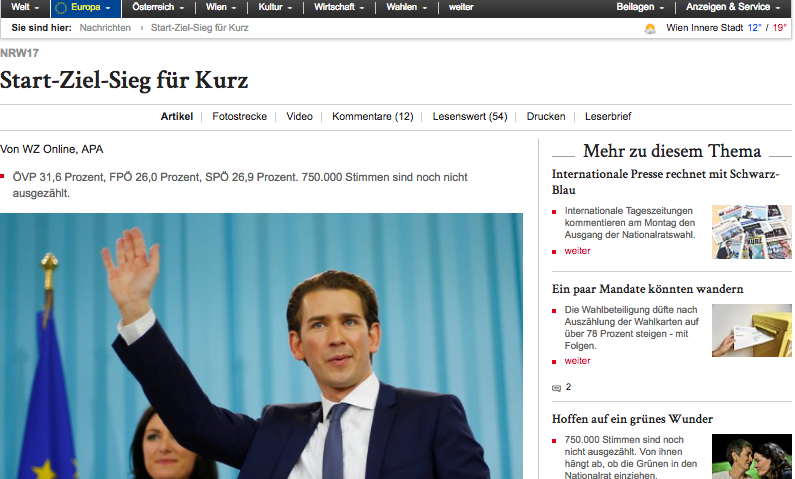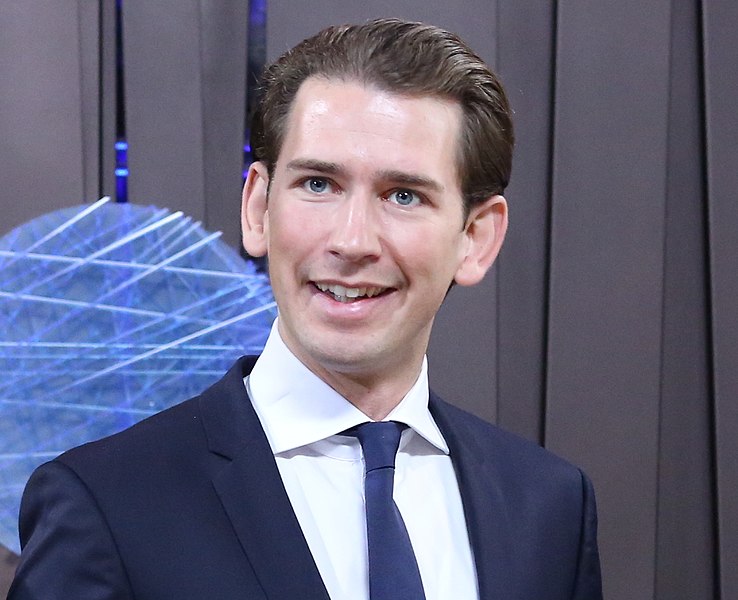Meet Sebastian Kurz, the 31-Year Old Opportunist In Charge of Austria Now
He only looks like Richard Spencer Lite—I think.

Wiener Wiener Chicken-Diener. Screengrab: WIENER ZEITUNG
Well, I guess “congratulations” are in order to everybody’s most annoying freshman roommate who never left his Ayn Rand phase, 31-year-old Austrian politician Sebastian Kurz, who has just (presumably) become the youngest national leader in the European Union—a thing he probably hates, or is at least pretending to hate to appeal to the new far-right base of his revamped party, the ÖVP, or Austrian People’s Party.
On Sunday, Kurz and the ÖVP won the Austrian Nationalratswahl (NOTT-see-oh-NOLL-rotts-VOLL), or national legislative election, with 31.5 percent of the vote. On the surface, this doesn’t seem too bad. The ÖVP have long been the Austrian center-right sister party to Germany’s CDU, headed by your mom and mine, Angela Merkel. Alas, Mutti-Style centrism wasn’t winning elections in the land of Mozart (perhaps it just had too many notes). So, what better thing to do to Austria—a country where it legit still feels like 1910 many places, and an impressive portion of the population still spends 5 hours a day nursing a single cup of coffee and reading print newspapers in a Kaffeehaus whilst still somehow being gainfully employed—than “disrupt” that motherfucker with some good old Millennial populism?
Sebastian Kurz saw the way the wind was blowing: Bleak youth unemployment rates all across Europe, plus the recent refugee crisis, plus Austria’s long habit of nativist sentiment in a portion of the population (for more on that, check out this book by Janek Wasserman), equals…a whole bunch of young people ready to do shit like sail out into the goddamned ocean with the express purpose of blocking boats full of desperate refugees. Or, at any rate, vote for Kurz, if he packaged himself right. (This also involved changing the party’s long-held official color from black to a shade of turquoise Michael Kors might call very now if he were your Austrian grandmother.)
Kurz has been interested in conservative politics since his very recent youth; he attempted to rebrand the ÖVP at 16. Once he came of age, though, they started taking him seriously: He rose quickly through the ranks, becoming Europe’s youngest Foreign Minister when he was just 27 (at which age I worked nights as, I kid you not, a “professional TV watcher” at a nebulous startup near Canal Street).
In May of this year, Kurz assumed leadership of the ÖVP, whereupon he yanked the party so far right (on the surface, at least), that a competing party founded by actual former Nazis, the FPÖ (Freedom Party) accused him of plagiarizing its super-awesome ideas, such as Euroscepticism, denying social welfare to immigrants and closing Islamic Kindergartens—which, of course, will immediately result in way more jobs for Austrian young people. (How?)

Backpfeifengesicht or nah? Photo: EE2017EE Estonian Presidency/Wikimedia Commons
Now, I cannot be the only one who sees this guy and immediately thinks, Oh Jesus H. Christ, the Austrians just elected Richard Spencer Lite. Indeed, Vienna tabloid Falter caused a huge hubbub with this cover, essentially the print version of clickbait (aka the most Austrian thing that has ever existed), proclaiming Kurz Der Neofeschist, or “the Neo-fesch-ist,” a very edgy wordplay that means, essentially, “the well-dressed asshole,” but which contains obvious connotations.
Neo-what now? I needed somebody to talk me down; fortunately, I have some Austrian friends who know some things, from my year spent Promoting Mutual Understanding Between Cultures as a 2008-2009 Fulbright grantee in Vienna. So I tracked down Felix Faltin, who at 31 himself is sort of the anti-Sebastian Kurz. He’s a lifelong Social Democrat and currently works for the party as a policy adviser, and he took some time to explain Sebastian Kurz using very small words so that even I could understand. Haircut and smirk aside, Kurz is not, actually, a Richard Spencer Who Actually Speaks German Well. “I see more parallels with Ronald Reagan, to be honest,” Faltin told me. “Both glammy media stars, both kind of without content, and all the more vicious for it.”
So here’s the thing about Sebastian Kurz. He’s not like the AfD in Germany—the far-right party with those crazy racist pig posters, that just entered parliament but that nobody even wants to sit next to in the chamber. He’s not even really like the FPÖ, even though he deliberately copped their steez to win. “He’s a 31-year-old cosmopolitan on the outside,” explains Faltin, “but a 64-year-old petty bourgeois [Spießer, pronounced SHPEE-sur] on the inside. It’s 2017, and this guy is afraid of globalization, diversity and big cities. Vienna, the most livable capital in the world, gives him the creeps. Kurz stands for nothing, which allows people to project anything onto his slick, well-managed political persona.”
His platform, Faltin says, is just “a random collection of special-interest positions and common-sense policies, glossed over with catchy headlines.” (Sounds familiar.) Austria, that Socialist hell-hole with literally the best standard of living anywhere, is “about to see a massive redistribution of wealth from the bottom half of the income distribution towards the very top.” And that, of course, is and has been the VPÖ’s MO all along, racism be damned. That’s why it’s so perplexing that much of Kurz’s support came from young people. You’re a young person, I said to Faltin. What’s the deal?
“I wouldn’t overstate millennial support for the extreme right,” he cautions. “There’s a lot of progressive energy in my generation. But [there’s] also impatience. I think the far right (and sometimes left) offers clarity on this point. Instead of explaining how we can make society work for everyone, which is often quite complicated, they say You’re right, they’re wrong. That’s just what hyper-individualistic Millennials with short attention spans want to hear.” Kurz reached that 31.5 percent, then, by bringing just enough young men into the fold to bolster the ÖVP’s stronghold with the 64-year-old Spießer demographic—plus a few older women, thanks possibly to the Schwiegersohnphänomen (SHWEEG-ur-zone-PHAY-noe-MAYN), or “son-in-law phenomenon,” meaning that Kurz is just the kind of well-to-do young man that the older conservative mom would like to see marry her daughter.
When Donald Trump won the US presidential election, I was depressed, yes, but also probably more surprised than I should have been. With Austria, I’m depressed, but not surprised at all. This is because the year I lived in Vienna, 2009, was also an election year (fact: there is always an election in Austria), and everywhere I went, I saw posters from the FPÖ insisting that I lived in a Sharia-controlled hellhole.

This translates to “The West in Christian Hands,” but they use the Olde-Tyme word for The West, Abendland, or “Occident.” Photo: Rebecca Schuman
Ironically, I did live in Vienna’s Sixteenth District, which has a large immigrant population and is thus considered a “bad” neighborhood (it is most decisively not). Still, when Jörg Haider, the flamboyant onetime FPÖ leader (and later head of his own splinter party), died in a car accident a month after I arrived, one of my neighbors (presumably not the Polish, Serbian or Turkish one) changed their wireless router name to Jörg Haider, ein Held, i.e. “Jörg Haider, a hero,” correct comma placement and all—so that the rest of us knew, I suppose, to watch our backs. Meanwhile, before Haider, there was Kurt Waldheim, an actual ex-Nazi who got elected President in 1986. Austria has survived all of those guys, so it will probably survive Sebastian Kurz, who by all accounts is intelligent, if (more than) a bit opportunistic.
Whether any of Kurz’s more extreme campaign promises come to fruition depend once again on the efficacy of a parliamentary democracy distinguished largely by its ability to gridlock itself. What is certain, however, is the depressing current in European (and, yes, worldwide) politics. In more and more countries, in order to be electable, the shrewd politician today must appeal to the powerful far-right Millennial male demographic—a sentence that makes me nauseous to even type.
